A Cultural Culinary Getaway in Messolonghi
A brave history and uniquely beautiful...
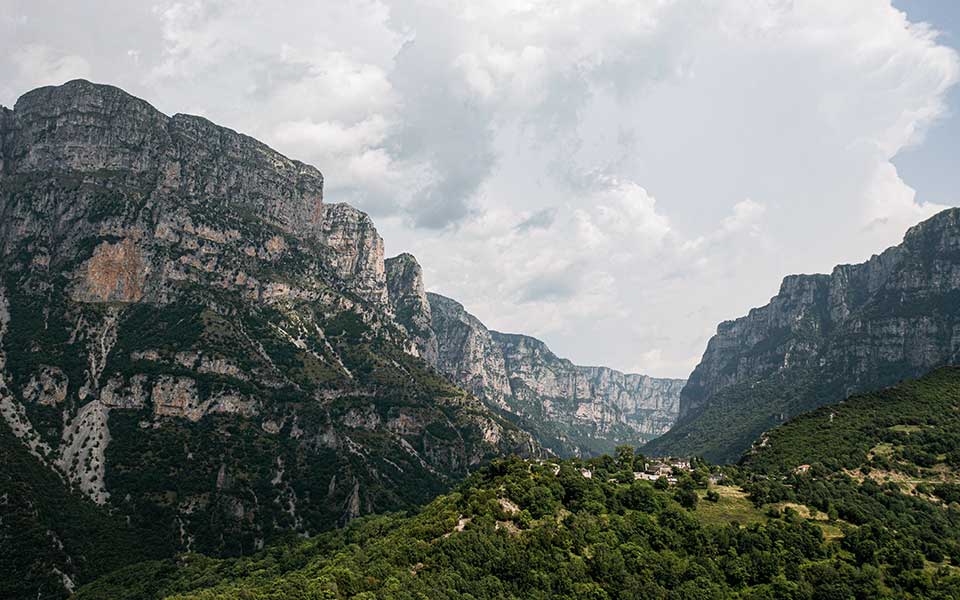
View of the Vikos Gorge and the homonymous village.
© Dimitris Tosidis
It may rain, even in the heart of the summer. The scent of the soil and herbs of the Vikos Gorge will fill the air, while the stone-built pathways and majestic cliffs will glisten. Make sure to bring a jacket for the peaceful evenings in the squares. When the dancing begins and passions ignite, you will see the people of Epirus revealing their souls on the cobblestone paths to the sounds of the clarinet.
In Zagori, this season offers refreshing dives in freshwater, enjoyable hikes, exquisite food, and… no loneliness at all, contrary to what you might have thought –because the secret is now shared by all.
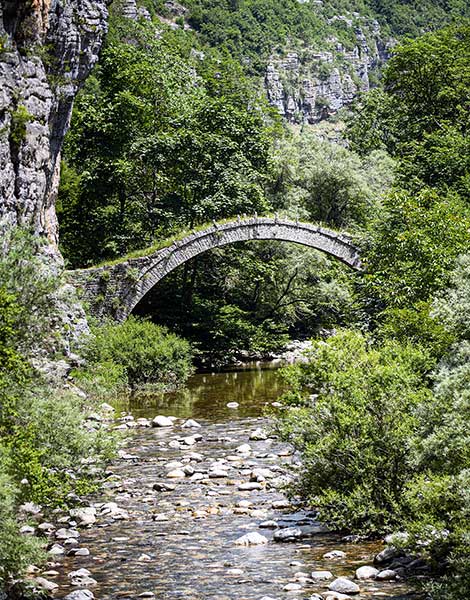
The bridge of Kontodimos or Lazaridis
© Dimitris Tosidis
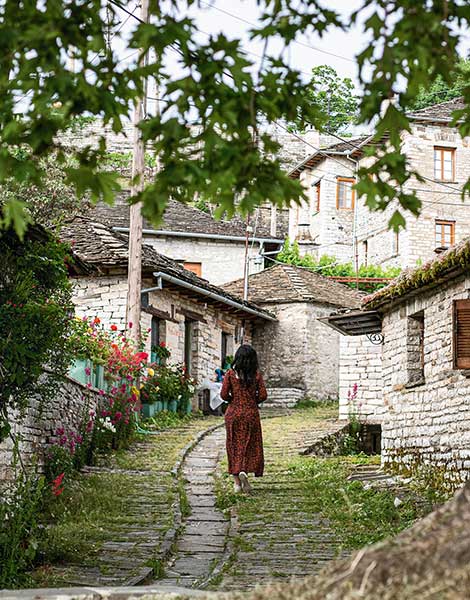
A walk in the cobbled streets of Kapesovo.
© Dimitris Tosidis
Papigo, Monodendri, Vitsa, Dilofo, Koukouli; a total of 46 stone-built villages divided into Eastern, Central and Western Zagori. Papigo was the first to developas a tourist destination, and rightfully so, as it is located in a privileged position beneath the Towers of Astraka, five imposing rock formations. Each village deserves a visit each village for its own unique reason: Monodendri for the Monastery of Aghia Paraskevi, the views of the Vikos Gorge, and the Rizareios Handicraft School; Koukouli for the Botanical Museum with the collection of Kostas Lazaridis; Vitsa for the famous Skala staircase leading to Missiou Bridge. Our personal favorite is the more peaceful Kapesovo, simply for enjoying a coffee onthe square, at Mezaria café, under the enormous plane tree.
Stone continues in the form of bridges, of which there are more than one hundred in these parts. Circular or with pointed arches, single, double, or triple arches, depending on the terrain requirements. If you want to see several of them concentrated in one place, visit the village of Kipi. The bridges of Kokkori, Kalogeriko, Kontodimou and Mylos are some of those that are connected through a hiking trail you can follow on your own or with the experts, just like all the hiking routes we mention (Trekking Hellas, Tel. (+30) 694.475.0009; Tasos Anestis, mountain guide, Tel. (+30) 694.551.9851).
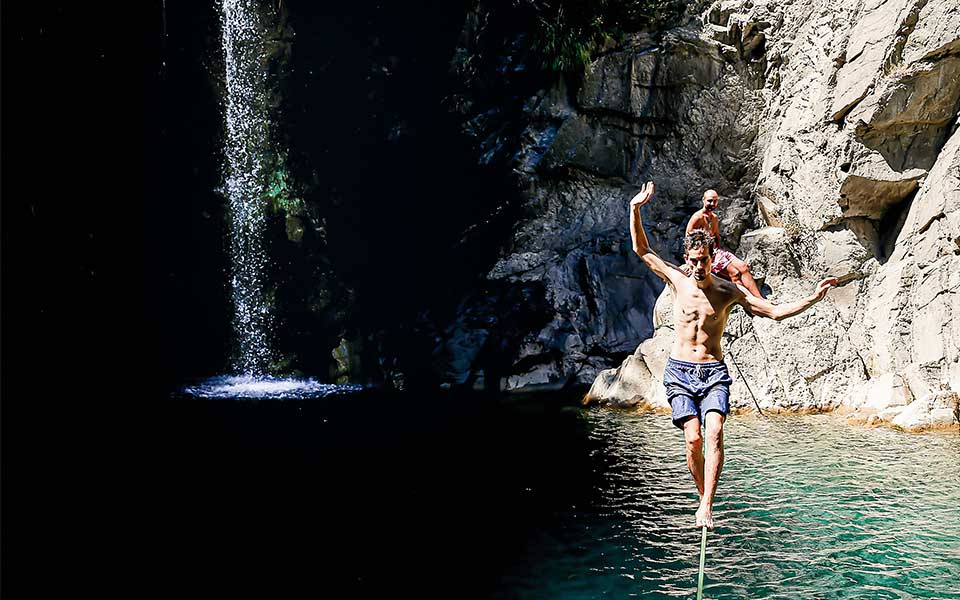
Games at the waterfalls of Iliochori.
© Dimitris Tosidis
Although the mountain has fresh running waters, and therefore ice-cold, the experience of swimming in them is incomparable. There are sandy beaches on the banks of the Voidomatis River, waterfalls for natural hydro-massage, platforms for dives to cleanse you of everyday life. However, because the area is a National Park and a UNESCO Geopark, swimming is normally prohibited. If you choose to swim, make sure to do so in a way that respects the principles of sustainability: don’t use sunscreen, don’t leave trash behind, don’t pick flowers or herbs.
At the beach of Aristi, next to the Aristi-Papigo Bridge, at the famous Ovires or Kolymbithres, between Megaloand Mikro Papigo, or at the waterfalls of Balta di Striga in Iliochori, be prepared for real crowds in August! For more secluded spots, ask the locals to reveal their secrets.
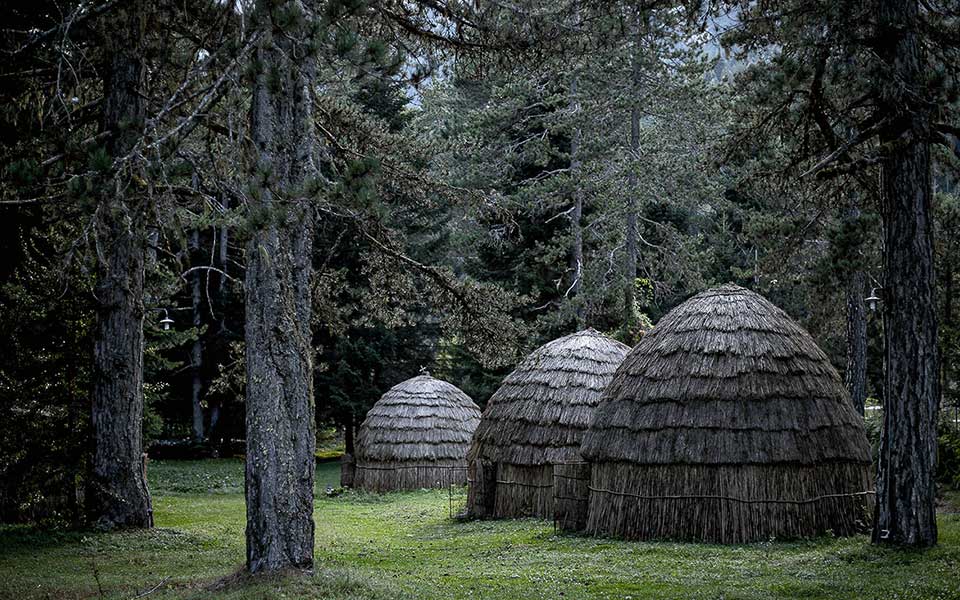
The Sarakatsani Sheepfolds in Gyftokampos.
© Dimitris Tosidis
The area is renowned for its celebrations that comprise lamentations, awe-inspiring polyphonic singing, zygies (musical ensembles with clarinet, violin, lute and tambourine), paper lanterns, circular dances and emotion in the “exits,” the closing songs of each festival. In Vitsa, the festival lasts for three days and follows its own ritual. On the third day, only the locals dance, and the instruments accompany the last visitors until they reach their cars, as dawn breaks.
The same goes for Tsepelovo. The festivals of Profitis Ilias (Prophet Elijah) in Kapesovo and St. John the Baptist in Dikorfo are calmer. Don’t miss the gathering of the Sarakatsani (transhumant shepherds) on the first weekend of August in Gyftokampos, which has recently been included in the country’s National Index of Intangible Cultural Heritage.
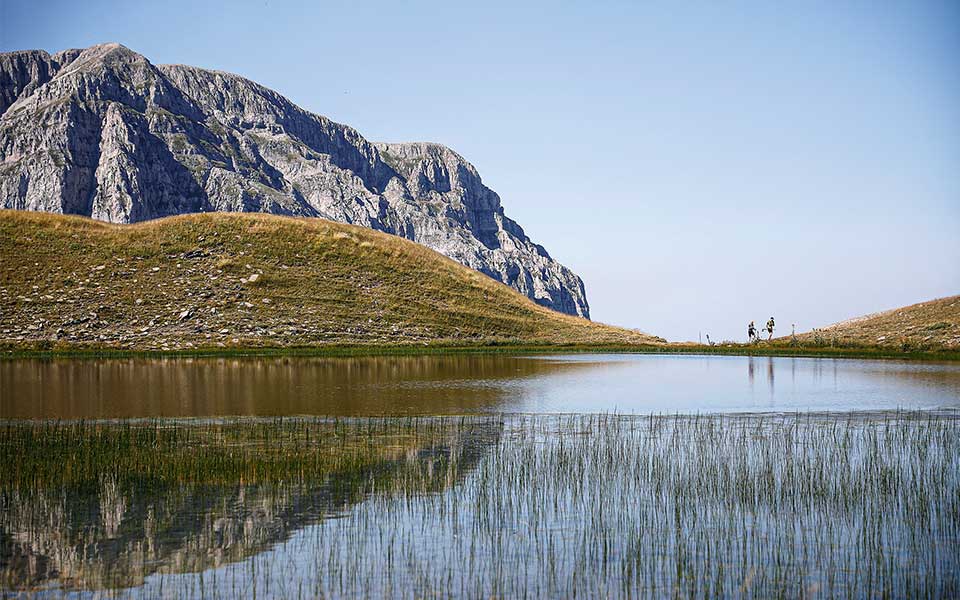
In Drakolimni of Tymfi, reached by hikers.
© Dimitris Tosidis
Mikro Papigo is the place to set off on the ascent to Drakolimni on Mount Tymfi and to Gamila, its highest peak. Steep cliffs and ridges, alpine meadows, forests, seasonal ponds and springs await. The route is quite passable and only requires good physical condition, which is why you will encounter many hikers from all over the world – it is one of the most famous trails in Greece.
It will take you three to four hours to reach the mountain refuge (Tel. (+30) 697.322.3100), where you can stay overnight to break up the journey, and then another hour to reach Drakolimni. A rare species of alpine newt still inhabit its waters. Due to the extremely delicate ecosystem, please refrain from swimming, even if others around you do so. More experienced hikers can ascend to the wild peak (two hours from the refuge).
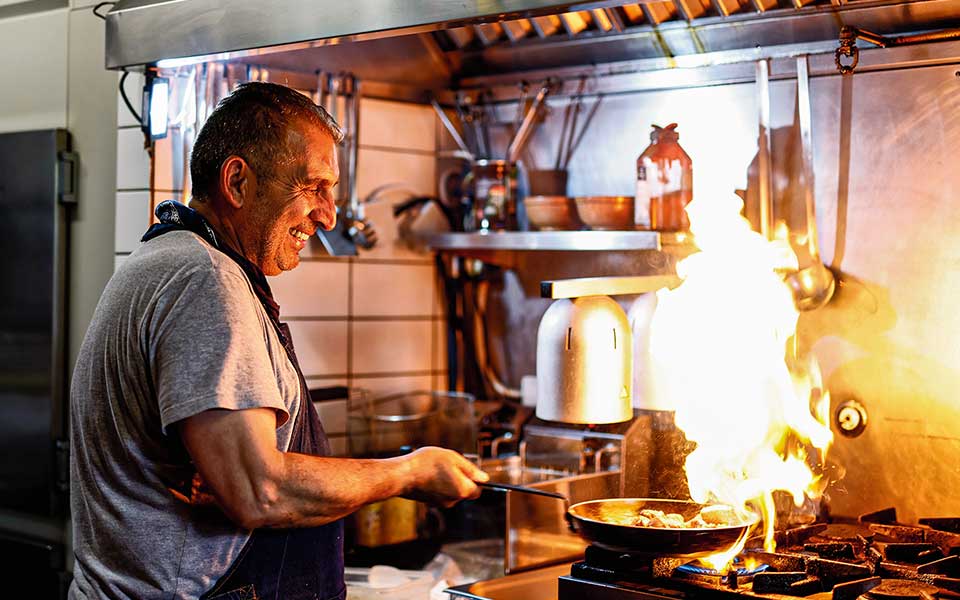
Takis Kounavos at Lithos Restaurant in Dilofo.
© Dimitris Tosidis
The area is known for its delectable pies, which come with a variety of fillings, meat and dairy products from nomadic shepherds, mushrooms, aromatic herbs found in the wild, and vegetables from vegetable gardens. The wise cuisine of Zagori alone is a reason to visit. Indulge in lavish meals at Astra (Tel. (+30) 26530.421.08, Megalo Papigo), Thucydides (Tel. (+30) 697.998.3798, Kapesovo) by appointment, Lithos (Tel. (+30) 26530.226.00, Dilofo), Dias (Tel. (+30) 26530.412.57, MikroPapigo), Sta Riza (Tel. (+30) 26530.715.50, Vitsa), or enjoy meze at tavernas such as Grylos (Tel. (+30) 694.591.6996) in Koukouli.
For desserts, all roads lead to Sterna (Tel. (+30) 26530.250.90) in Megalo Papigo, where you can also pick up excellent local products. For high-quality honey and bee products, visit Melistrati (Tel. (+30) 694.760.2935) in Monodendri.
A brave history and uniquely beautiful...
Unspoiled beaches, authentic flavors, and a...
Whether it’s the charming town of...
A challenging summer ride across the...